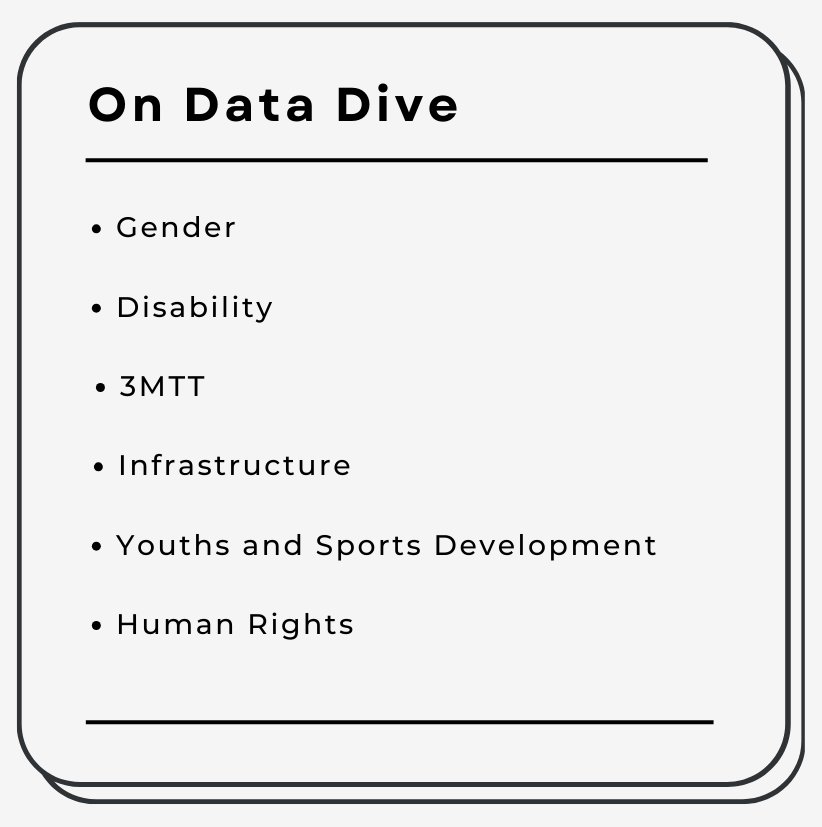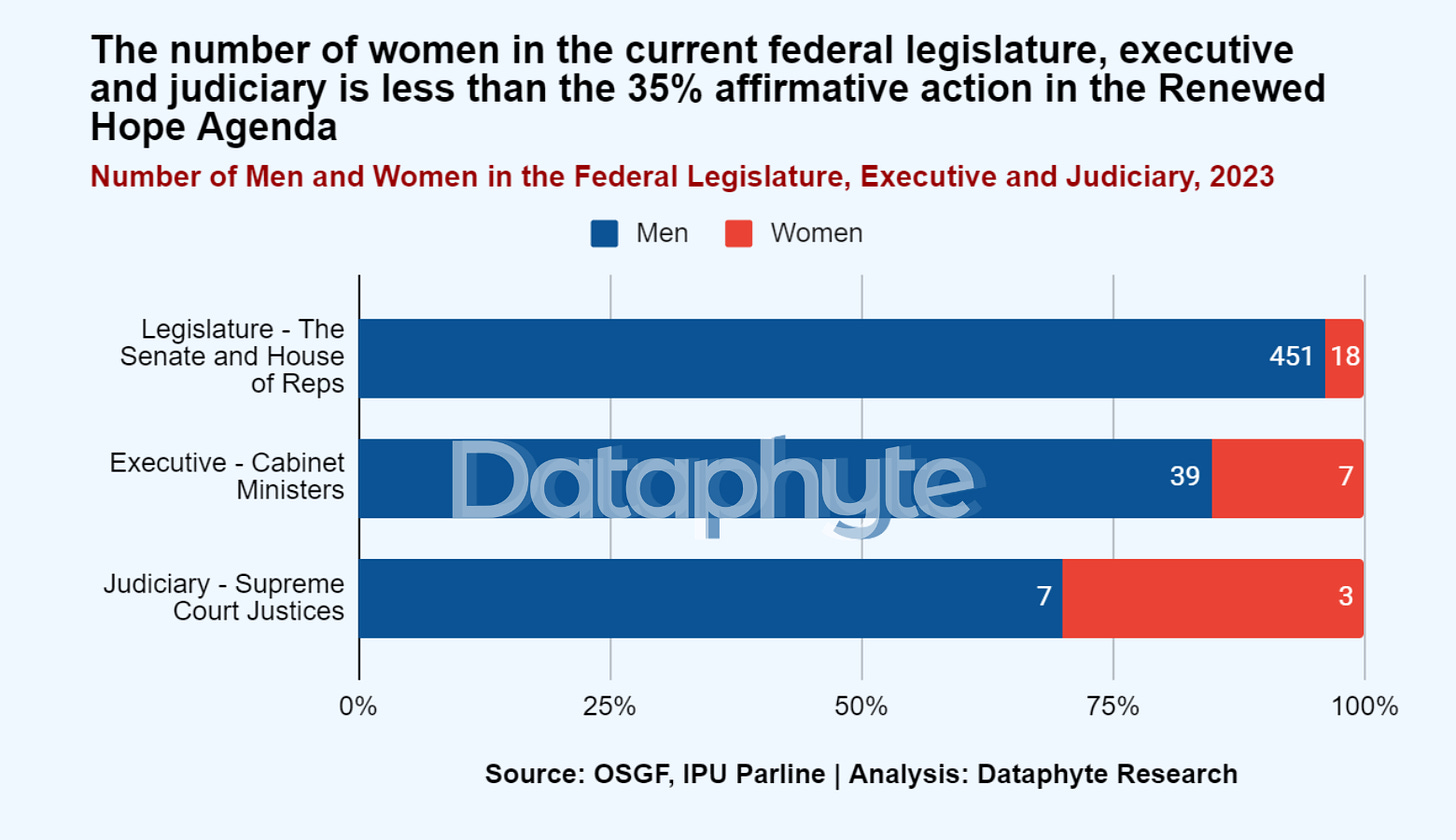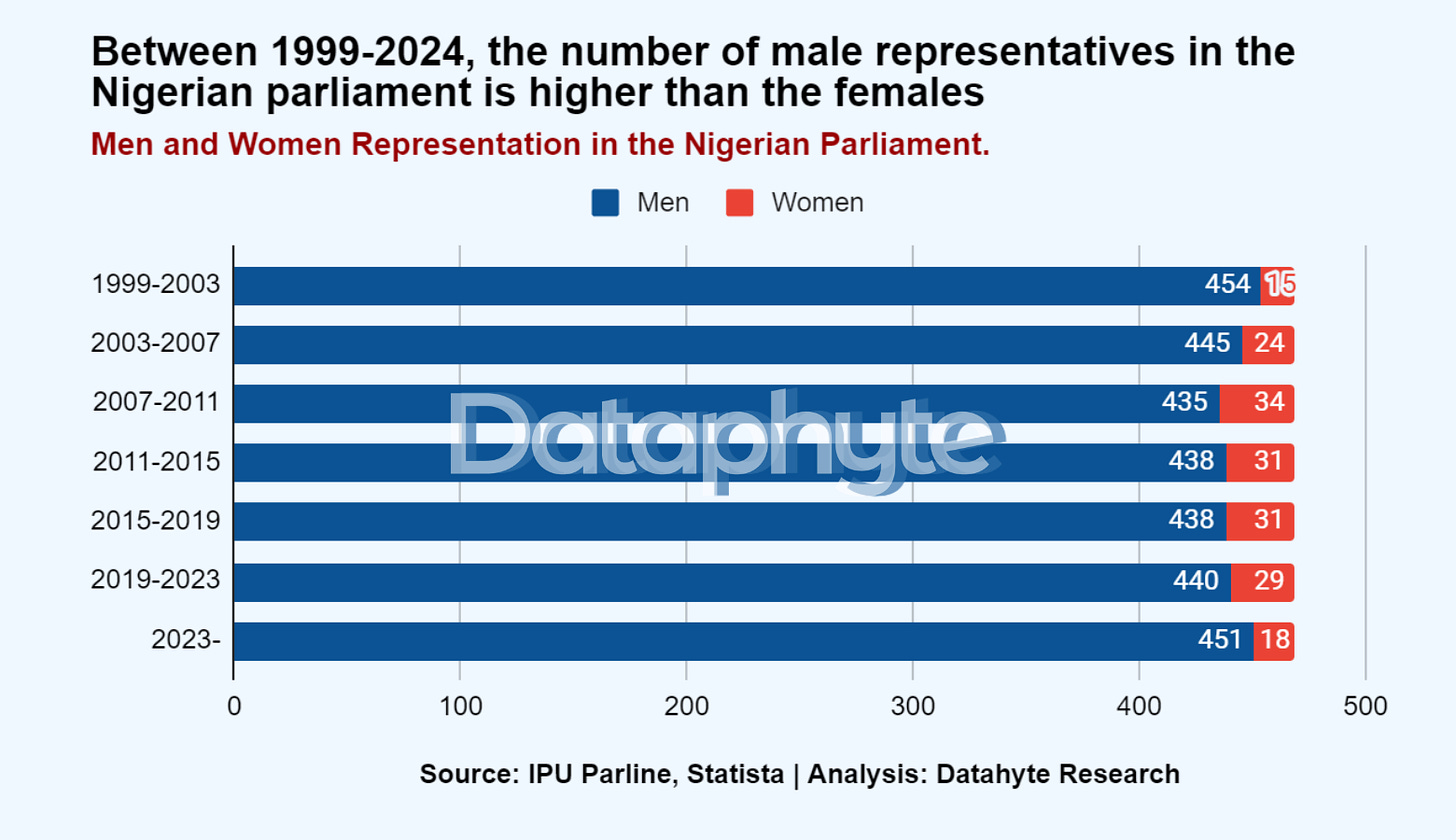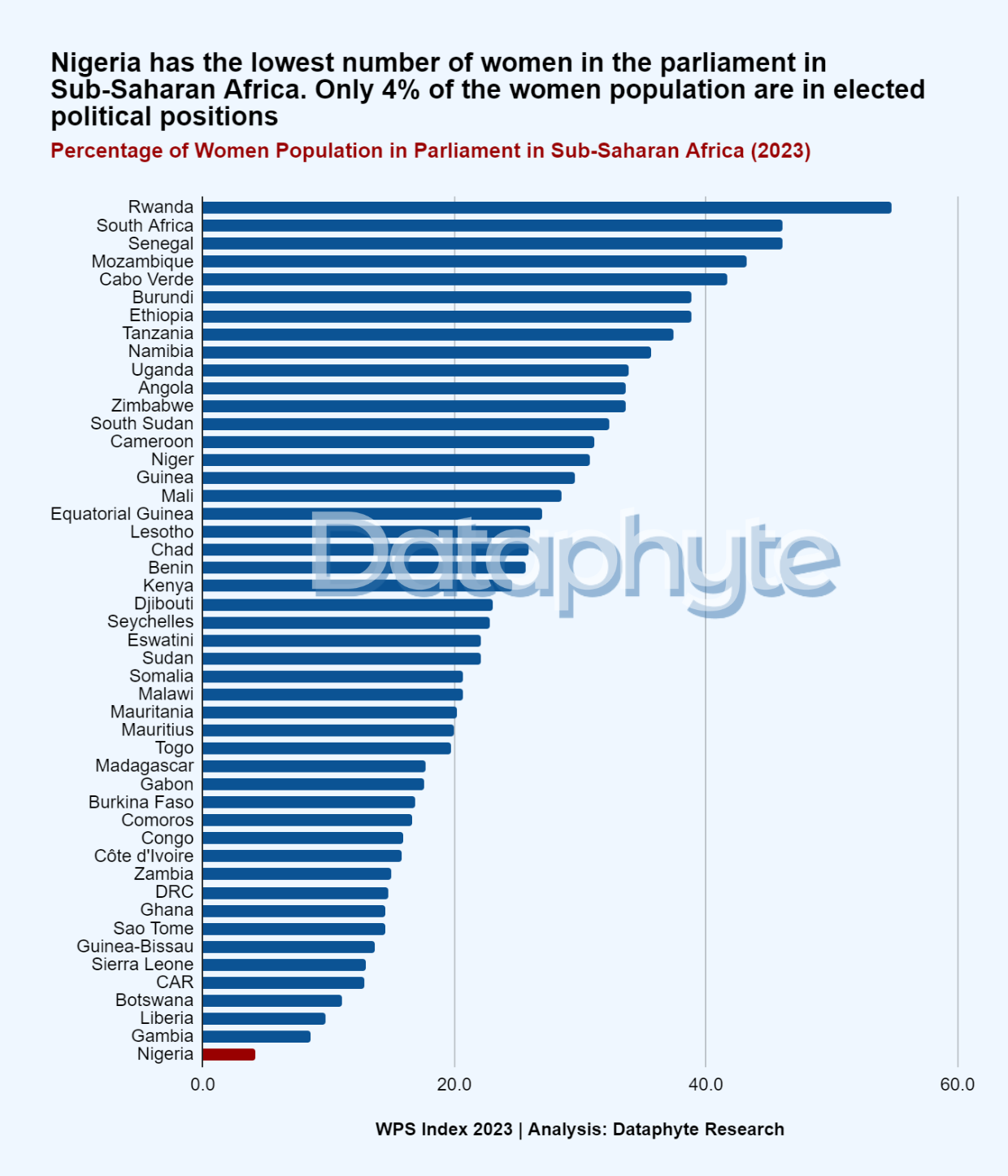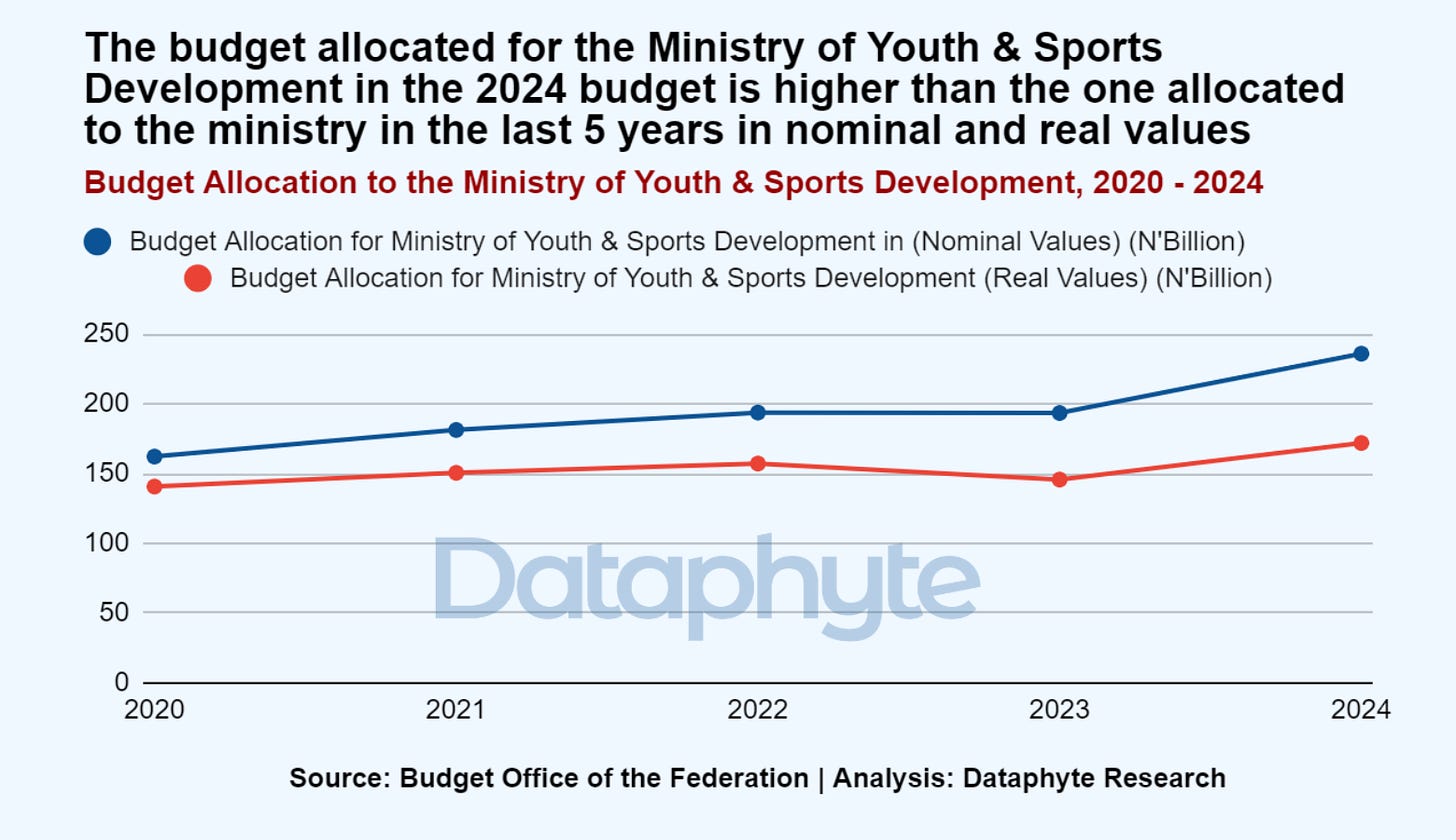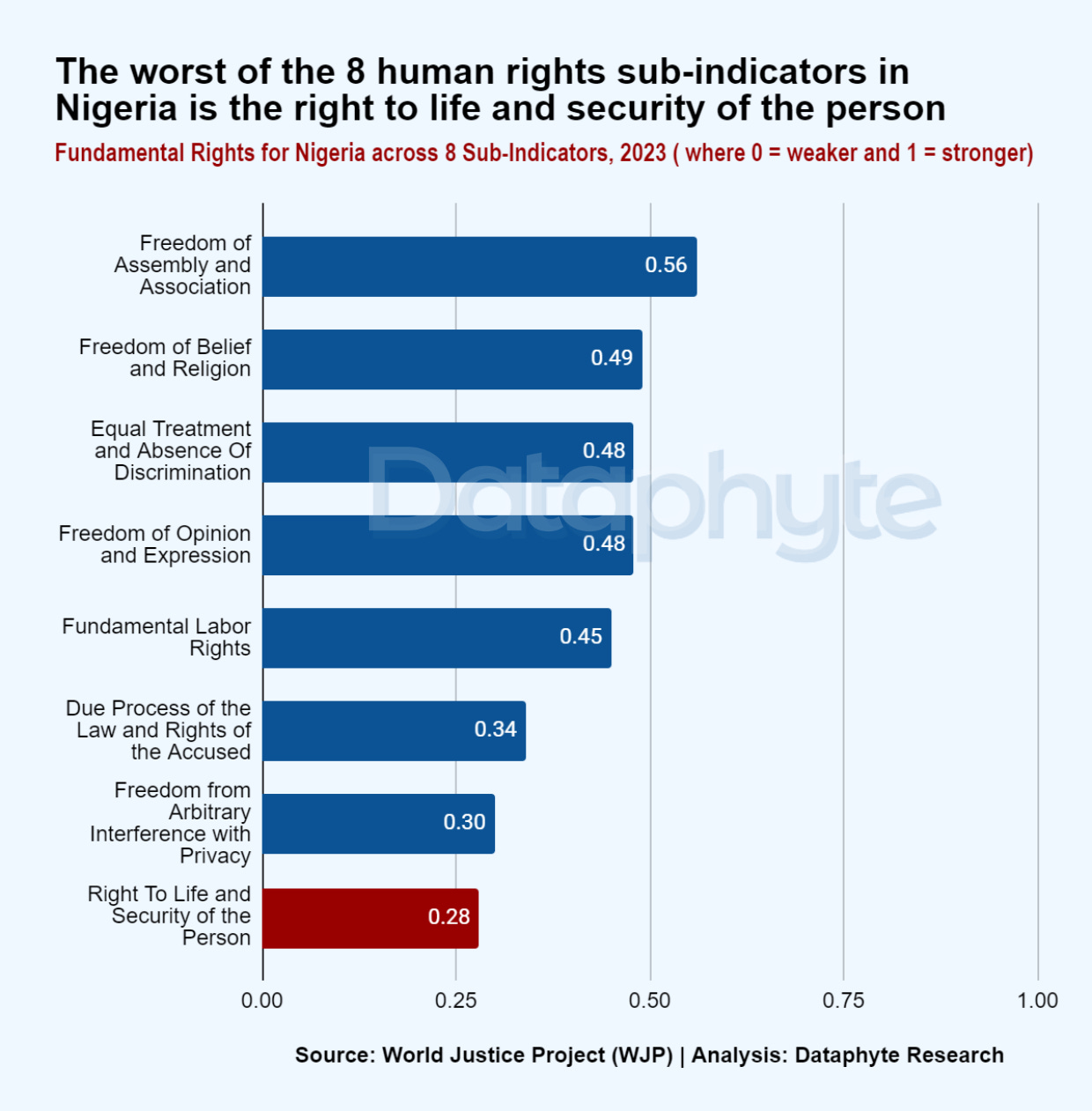Gender
Tinubu Achieves 5% Gender Inclusion in First Year
Women constitute only 5% of the Tinubu-led 3-tier government, falling 30% points short of the 35% affirmative action outlined in his Renewed Hope Manifesto document.
Overall, women are less represented than men in the Legislative, Executive, and Judiciary.
Currently, women constitute only 15% of President Tinubu’s cabinet and just 4% of members of the Senate and House of Representatives.
This imbalance in women's representation in politics may increase gender-biased policymaking and decisions in the executive and the parliament, leading to a lack of attention to women's issues such as gender-based violence, sexual harassment, girl child education, child marriage, and female gender mutilation.
In his Renewed Hope Agenda, Tinubu pledged that his administration would prioritize gender equality at all levels and increase women’s participation in government to at least 35% of all government positions.
In the last 25 years, there has been a consistent pattern of low female representation in the Nigerian parliament, both in the Senate and House of Representatives.
Under the current administration, women comprise only 18 of 469 parliament members. This is the second-lowest number of women represented in parliament since 1999.
The lowest number of women in the parliament in Nigeria’s history was during former president Olusegun Obasanjo’s administration between 1999 and 2003, with only 15 women out of the 469 members. The highest record is between 2007 and 2011.
According to the Women, Peace and Security Index (WPS) 2023, the percentage of women in the Nigerian parliament is only 4%, the lowest among the 48 Sub-Saharan African countries on the list.
On the other hand, Rwanda has made significant progress in gender balance in public governance, with women accounting for 54.7% of the Rwandan parliament.
This indicates that the Rwandan government has achieved fair representation between genders, and ranks first in female inclusion in the parliament among the 48 Sub-Saharan African countries.
The WPS Index is an annual report that combines indicators of women’s inclusion, justice, and security, to track trends of inclusion, equality, and diversity in selected countries across the world.
The pattern of government composition across successive administrations shows that women lag significantly behind men with regard to opportunities to play a role in Nigeria's political landscape.
The country continues to experience a history of male-dominated governance, potentially leading to gender-biased policies.
How true is this?
Besides Tinubu’s failure to meet the promised 35% gender representation in his government, there are other instances where his few women representatives fall short of their strategic gender inclusion roles.
An instance where a sitting Minister of Women Affairs under the Tinubu administration was seen threatening female victims of sexual harassment by a Professor at the University of Calabar raises questions on the veracity of the idea that more women in government will automatically lead to gender-favorable policies.
According to the Organization for Economic Cooperation and Development, ensuring that public leaderships reflect the demographics they serve, including gender, and ethnic representation, is essential for the fairness and responsiveness of public policies and institutions.
However, gender fairness in politics transcends having an equal share of the men and women population in government.
Gender fairness requires that men and women irrespective of their gender identity have equal access to participate in the decision-making process without discrimination of any sort.
Disability
In November 2023, President Tinubu appointed a person with disability as Senior Special Assistant to the President on Disability Matters.
This appointment offers a representation for persons with disabilities (PWD), enabling them to influence and help shape policies that are favorable to PWDs.
With this appointment, the Tinubu-led administration signifies progress in Diversity, Equality, and Inclusion (DEI).
However, can one representative in the executive only effectively advocate for the approximately 29 million individuals with some disability in Nigeria?
As seen in 2016, former president Muhammadu Buhari also appointed a person with disability as the Senior Special Assistant on Disability Matters.
About 29 million Nigerians are living with disabilities and they constantly face discrimination, seclusion, and prejudice.
As regards influencing policies that promote the inclusion of persons with disabilities, it takes a member of the community to understand their rights and mechanisms to implement those rights fully.
For instance, after his appointment, the Senior Special Assistant to President Tinubu on Disability Matters, Mohammed Isa, in November 2023 facilitated an empowerment program for persons with disabilities (PWDs) through the Small and Medium Enterprises Development Agency of Nigeria (SMEDAN).
This suggests that more can be achieved if PWDs are more represented in government.
Like gender inclusion conversations, the exclusion of persons with disability in various spheres of life is a global phenomenon needing sustained debates and advocacy for inclusivity and accessibility.
According to the United Nations Division for Social Policy Development, to achieve the internationally agreed development goals, the inclusion and integration of the rights, and well-being of persons with disabilities must be prioritised at national, regional, and international levels.
3MTT
The Ministry of Communications, Innovation, and Digital Economy in November 2023, launched the 3 Million Technical Talent (3MTT) initiative.
This aligns with President Tinubu’s Renewed Hope vision to build technical talents to power Nigeria’s digital economy and lead in digital disruption and technological innovation.
Digital innovation has spawned new career sectors, increasing the demand for technical talents to lead the digital evolution. To keep pace with advanced economies, developing countries are deploying resources to create new frameworks and strategies to meet global standards. Nigeria is not exempted.
The 3MTT program adopted a pedagogical approach to train tech enthusiasts in relevant tech skills and competencies, aiming to produce technical talents capable of driving innovation and meeting the demands of the evolving digital landscape.
For the first phase, the ministry said it trained 30,000 fellows in high-demand technical skills, representing 1% of the overall target.
The training focused on 12 technical skills, including Software Development, UI/UX Design, Data Analysis and Visualisation, Quality Assurance, Product Management, Data Science, Animation, AI / Machine Learning, Cybersecurity, Game Development, Cloud Computing, and DevOps.
In February 2024, the Minister of Communications, Innovation, & Digital Economy, Dr. Bosun Tijani, announced the launch of the 2nd phase of the 3MTT training with over 270,000 selected fellows.
The cohort, which will last 12-18 months, will equip fellows with core technical skills in line with the initiative's overarching goals.
This initiative is expected to significantly boost Nigeria's capacity to compete on a global scale, fostering a new generation of tech-savvy professionals who can contribute to both the local and international tech industries.
Infrastructure
Recently, the federal government announced that it had commenced the construction of the 700km Lagos-Calabar coastal highway.
This roadway is poised to become a major route linking the southwest to the south-south, thereby accelerating economic integration and regional trade.
Similarly, in April 2024, the federal government secured a $600 million investment deal with Danish shipping and logistics firm A.P Moller-Maersk. The funds were secured to enhance Nigeria's current port infrastructure and facilitate the accommodation of additional container shipping services.
In the last 12 months, the federal government made significant efforts to improve infrastructure investment and growth.
Nigeria has a wide infrastructural gap, which is evident in its ranking as 24th out of 54 African countries surveyed for the overall quality of infrastructure in the 2020 Africa Infrastructure Development Index (AIDI)
With a score of 23.2 points out of 100, Nigeria lags behind its African counterparts, Seychelles and Egypt, who ranked 1st and 2nd with scores of 96.7 and 88.3, respectively.
According to the Reviewed National Integrated Infrastructure Master Plan, Nigeria will need an estimated $2.3 trillion in investment in public infrastructure to close its infrastructure deficit over the next 23 years.
In another instance, the president approved upgrading 16 key health facilities in the country's six geopolitical zones. The process will involve the modernization of key specialist healthcare facilities, equipping them with state-of-the-art medical technology, enhancing infrastructure, and bolstering capacity to provide advanced medical care and services.
These major developments, if sustained, will bridge Nigeria’s infrastructure gap and expedite economic growth.
Youths and Sports Development
The budget allocated for the Ministry of Youth and Sports Development in the 2024 budget under the Tinubu-led administration is higher than the one allocated to the ministry in the last 5 years both in nominal and real values.
Dataphyte analysis shows that the 2024 budget allocation for the ministry remains the highest even after the annual inflation rate across the years reviewed was factored in. (The inflation rate used to calculate for 2024 is as of March 2024).
This suggests that the ministry has more resources at its disposal than in past years to carry out development-focused projects and activities aimed at the overall enhancement of national sports and youth development.
However, sufficient resources do not always guarantee the effective implementation of budgeted projects and programs. Establishing a critical framework for constructive implementation is essential.
Another notable decision that the Tinubu-led administration made in the last 1 year towards youth development is the federal government’s approval of N110bn for the youth development fund and agric scheme.
These diverse programs and policy changes in youth and sports development highlight the Tinubu administration's commitment to promoting youth advancement in sports and other areas. However, the effective implementation of these policies remains a critical concern as the administration continues its term in office.
Human Rights
Human rights abuses remain prevalent in Nigeria. Reports of police brutality, unlawful detention, and extrajudicial killings continue to surface, raising concerns about the protection of basic human rights.
The narrative is similar in the last one year of the Tinubu-led administration. There are myriads of cases of unlawful detention, extrajudicial killings, police brutality, harassment of citizens by the state force, and other activities that pose a threat to the fundamental rights of citizens.
Among these events is the Okuama killings, allegedly carried out by the Nigerian army in retaliation for the deaths of 17 soldiers killed by a militant group at Okuama.
This explains the World Justice Project’s estimation that the worst of the 8 human rights abuses in Nigeria is the weak protection of the right to life and security of the person.
Another instance is the stifling of press freedom, reflected in the unlawful detention of journalists by state security forces, forced disappearances, and baseless abductions.
Between September 2023 and May 2024, state actors have detained and arrested approximately 12 Nigerian journalists.
The two most recent cases are the abduction and arrest of Daniel Ojukwu, an investigative journalist with the Foundation for Investigative Journalism, and Madu Onuorah, the publisher of the Global Upfront Newspaper.
These instances of human rights abuses continue episodes of human rights abuse during the Buhari-led administration. A notable one then was the 2020 End SARS protests where peaceful demonstrators, who were calling for an end to police brutality, faced excessive force. This ultimately culminated in the tragic Lekki Toll Gate massacre, where numerous unarmed protesters were killed and injured.
Protecting citizens' fundamental rights and strengthening the rule of law remain critical challenges for the Tinubu administration as it strives to improve human rights conditions in the country.
This edition of Data Dive was written by Funmilayo Babatunde and edited by Oluseyi Olufemi.



